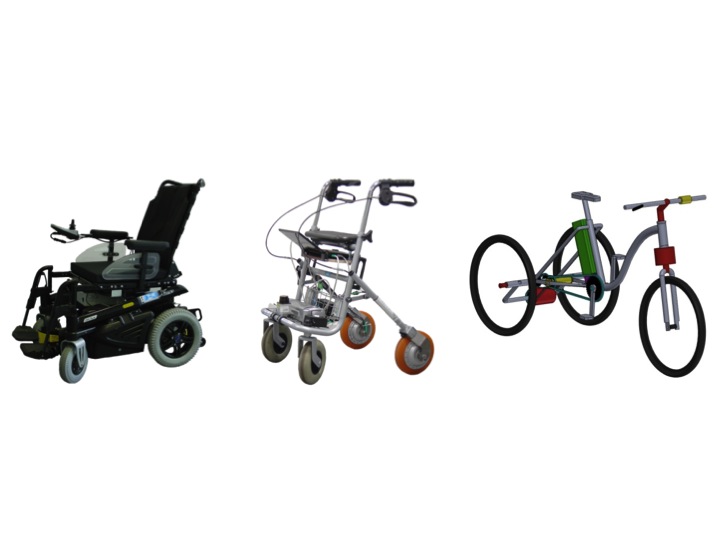For non-electric platforms, the Navigation Aid comprises odometry hardware in cooperation with a smartphone or tablet computer with GPS that interacts with Open Street Maps for precise navigation. Simple dialogues allow natural language interaction. Using additional laser-range sensors, the Driving Aid enhances the safety by recognising and warning for steps and obstacles, also enabling indoor navigation. For electrically powered platforms, the Navigation Assistant proactively corrects the driving direction, steering and braking accordingly. Fully autonomous driving will be supported in charted indoor environments. The care centre connection is activated manually, or automatically in case of a fall or crash, and permits the caregiver to visually inspect the situation when authorised by the user. End-users will be involved from the beginning in the design and evaluation of the mobility assistants for everyday usability. The iterative schedule implies two refinement phases, where the initial prototypes will be adapted according to the users’ feedback.
Objectives
The ASSAM project aims to compensate for declining physical and cognitive capabilities of elderly persons by user-centred development of modular navigation assistants for various mobility platforms, such as walker, wheelchair, and tricycle, enabling sustained everyday mobility and autonomy with seamless transition from indoors to outdoors in environments such as residential complexes, the neighbourhood quarter, or touristic areas. Modular assistance systems provide obstacle avoidance, navigational aid, cognitive assistance for visual impairment, and security by connection to a care centre in emergency situations.
Expected results and impact
Hardware and software variants of the mobility assistants (Navigation Aid, Driving Aid, Navigation Assistant) for the walker, wheelchair, and tricycle platforms will be developed and marketed within two years after the project end. Affordable add-on hardware for the platform-independent Navigation Aid, easily adaptable to non-electric wheelchairs and walkers by many manufacturers, will achieve a high market penetration. The ASSAM Forum will be set up for enterprises such as shopping centres, hotels, hospitals, airports or cities who intend to buy mobility assistants in numbers to rent to their clients for sharing.
Partners
Partners involved in the ASSAM project
- Project name: Assistants for Safe Mobility – ASSAM
- Website: www.assam-project.eu
- Coordinator: German Research Center for Artificial Intelligence (DFKI GmbH)
- Duration: 36 Months
- Starting Date: 01.06.2012
- Total budget: € 2.979.164
- Public contribution: € 2.039.942
Contact
Prof. Dr. Bernd Krieg-Brückner
E.: Bernd.Krieg-Brueckner@DFKI.de
T.: +49 421 218 64220

